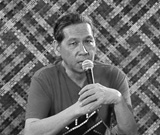Juror
Teddy Co
 [Juror’s Statement]
[Juror’s Statement]
I was invited to the first YIDFF back in 1989 to speak at the Asia Symposium moderated by Ogawa Shinsuke, at a panel discussing the question, Why are there so few Asian film documentaries being made?
That was the question that I had asked Mr. Kazuyuki Yano and Mr. Hiroo Fuseya of Ogawa Productions, at the 1989 Hong Kong IFF in April after learning that they were putting up a new documentary film festival. I had been introduced to them by Malaysian film critic Stephen Teo, and I was in Hong Kong to present some Filipino short films while Yano-san and Fuseya-san were there to observe. Six months later, with the encouragement of Stephen, Yano-san invited me to the first YIDFF to be part of a panel that addressed the problem of a dearth of Asian documentaries. My fellow panelists included my colleague Nick Deocampo, Teo, a Korean director, and a Malaysian producer. Kidlat Tahimik presented his film I Am Furious Yellow, and together with my fellow panelists and Roxlee, we all signed the Yamagata Declaration at the hotel on the last day of the festival, in which we declared that we would each return to our respective countries and vow to help promote the making of more documentary films. By the third YIDFF, the Asia Program competition section was born, and I’d like to believe that my question in Hong Kong and participation in the panel did contribute to the program, now a regular feature of YIDFF and an important platform for Asian documentarists.
In my jobs back in Manila, I had also helped in organizing documentary filmmaking workshops from 2010 to 2013, which helped new filmmakers like Jewel Maranan, Adjani Arumpac, Baby Ruth Villarama, etc. In my role as a cultural worker at NCCA, our Cinema Committee also gave out cash grants to over a hundred films, including a number of documentaries, some of which participated later in YIDFF. I remember the vow that I made at the Yamagata Declaration, and my signature is there in that document.
I watched many films at the first YIDFF and met many great filmmakers—Johan van der Keuken, Nestor Almendros, and the great Ogawa Shinsuke, YIDFF’s founding father. They’re all gone now, but that first festival and the city of Yamagata remain forever cherished in my memory. I had my first experience of snow at Mt. Zao, my first hot bath at a local onsen that cost 30 yen, and my very first taste of delicious soba. And the friendly people, especially the young and smiling festival volunteers and staff that made the festival such a success. After almost thirty years, I’m very happy to be back. Kampai!
Born in 1958 in Manila of ethnic Chinese parentage, he studied at the University of the Philippines. Not being able to find any film courses there, he designed his own cinema curriculum, cutting classes and spending more time in movie houses and art theaters than in school. He has been a cultural worker in cinema for the past 30 years. As a film archivist, he has recovered and restored films by great Filipino directors, like National Artist for Film Gerardo de Leon. As film curator, he organized retrospectives of major as well as overlooked filmmakers, and also of documentaries and short films, at venues like the Cultural Center of the Philippines. He has been on the selection committees of important local independent film festivals like Cinemalaya and Q Cinema. Since 2004, he has been a member of the Cinema Committee of the National Commission for Culture and the Arts (NCCA), the prime government agency tasked with promoting Philippine art and culture. In 2008, he co-founded Cinema Rehiyon, which is the largest annual gathering of films and filmmakers from all over the provinces of the Philippines. At NCCA, he is at present the Commissioner for the Arts, and also the Chairman of its Committee on Cinema. He is currently spearheading the country’s celebration of the centenary of Philippine Cinema, from 2017 to 2019.
